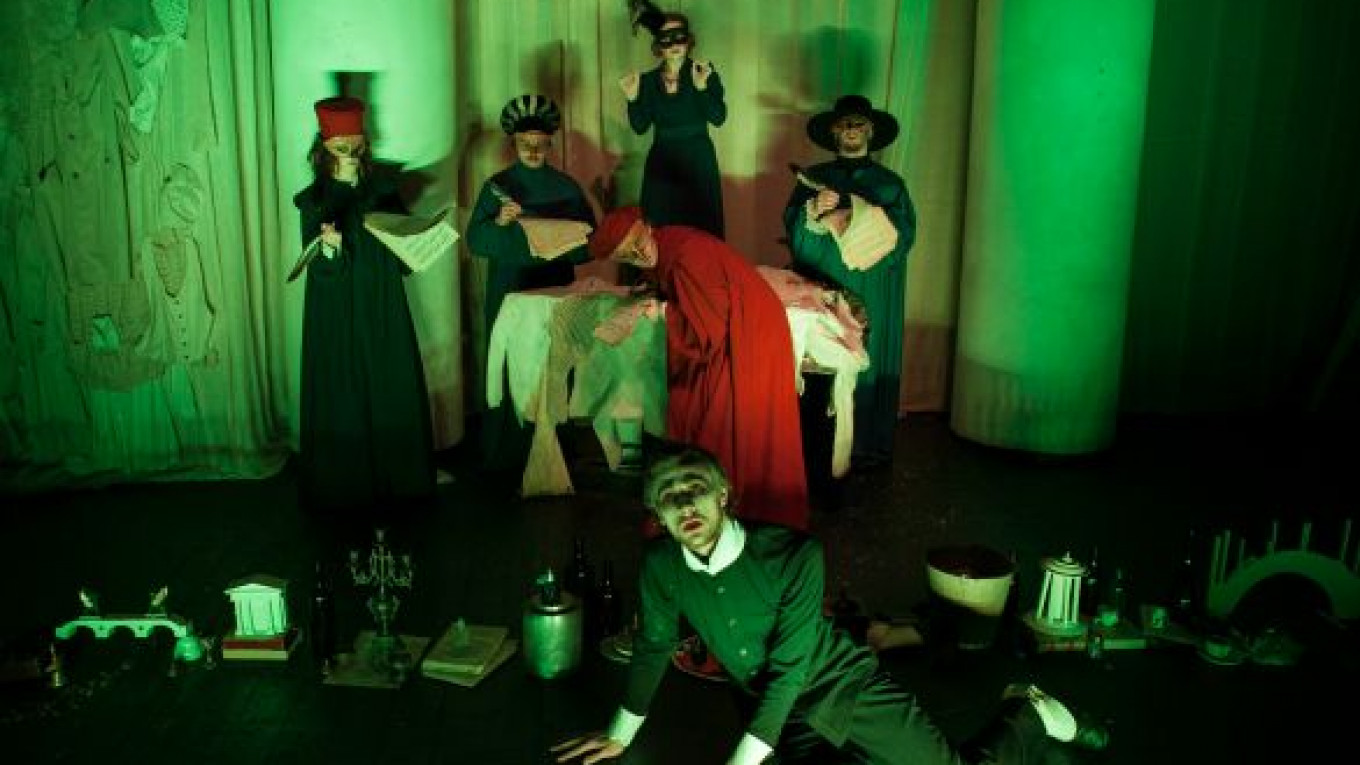Correction appended.
There are some things you never expect to see. An old Leo Tolstoy, shaved. The politician Vladimir Zhirinovsky with his mouth closed. The writings of Osip Mandelstam produced on stage.
Many epithets suit the poetry and prose Mandelstam wrote between 1907 and his death during the Purges in 1938 — exquisite, dense, majestic and meticulous come to mind right away. Theatrical does not.
Enter Dmitry Rudakov to turn our expectations and prejudices on end.
Osip Mandelstam's writings were never intended to be acted out in the theatre, but Dmitry Rudakov's group is giving it a shot.
Acting on an idea once tossed off by Pyotr Fomenko, Rudakov set himself the task of dramatizing and staging Mandelstam's famous short story "The Egyptian Stamp." In his new production on the old stage of the Fomenko Studio, he also plays one of the roles.
I will hardly enlighten anyone by saying that Mandelstam's prose stands out not for the stories it tells, but for way it tells them. His images, his diction, the structure of his writing: all of this was equally, if not more, important than character and plot.
There is a story to be gleaned from "The Egyptian Stamp." A young man named Parnok, at odds with the world, encounters two incidents: A tailor impounds his best shirt and morning jacket when he can't pay up, and his friend, a priest, is killed when the two attempt to interfere with a marauding group of vigilantes.
But even these events are more important as references than as elements of plot. A forlorn man doing battle with a tailor is an obvious reference to Nikolai Gogol's famous tragicomic story "The Overcoat." The image of killers roaming the streets of St. Petersburg is an equally obvious reference to the time of the Revolution, which occurred ten years before "The Egyptian Stamp" was written.
Mandelstam in this story clearly was playing with layers of time and cultural references, mashing up literature and history, politics and fantasy. He did so in a rich language that does not make for easy reading. His prose is something you ponder carefully, retracing your steps through the text so that unexpected allusions have an opportunity to arise from the dense linguistic surroundings.
In other words: How in the heck do you put something like this on stage?
Rudakov did it by plunging into the literature. The narrative is performed as narrative rather than dialogue. And the story is filled out with excerpts from Mandelstam's essays, poetry and other prose.
Working with designer Alexandra Dashevskaya, Rudakov sought to create a Mandelstamian atmosphere. The set is layered with objects emerging from, or disappearing behind, white gossamer drapes. There is a row of small, detailed objects and trinkets, running the entire width of the stage: a coffee grinder, glass bottles, a candelabra, an abacus and wine glasses among them. Some are included in the action, most are not.
Making sense of these objects is a little like reading Mandelstam: It's up to you to discern what is important and what is not.
Some of the most accessible and effective scenes involve the dreams that Parnok (Fyodor Malyshev) has about an Italian singer (Roza Shmukler) who caught cold and died in St. Petersburg in the mid-19th century.
Here the density of the production is broken up by humor and lightness. The actors move as though they were puppets and everything they do is shot through with irony. Shmukler's bright voice is beautiful and joyous even in those moments when she begins the cough that will lead to her death.
If the death of the singer is bound up in light humor, the death of the priest (Dmitry Zakharov) is not. This is portrayed with a striking image: A long line of bloody white shirts hanging over the stage on a pulley traverses in a solemn procession from one end to the other as if under its own power.
Parnok's miseries are multiplied when the tailor (Dmitry Smirnov) sells off his shirt and coat to the rude, self-important cavalryman Krzhizhanovsky (Rudakov). This brute, by his very existence, seems to confirm the ridicule Parnok's schoolmates heaped on him in childhood when they called him a "sheep" and an "Egyptian stamp."
I frankly don't know how well all this works as theater. It is often obscure to the point of being impenetrable. But isn't Mandelstam's story?
Rudakov's "Egyptian Stamp" is inventive and intriguing, whatever else it may be. And I must say I have nothing but admiration for those who would attempt the impossible. Plus or minus, this is a valiant effort.
"The Egyptian Stamp" (Yegipetskaya Marka) plays Mon. at 8 p.m. at the Fomenko Studio old stage, 30/32 Kutuzovsky Prospekt. Metro Kutuzovskaya. Tel. 499-249-1921. fomenko.theatre.ru. Running time: 1 hour, 25 minutes.
Correction: Due to an editing error, a story headlined “Silver-Age Symbolist Has Work Adapted for Stage” on page 16 of Thursday's newspaper incorrectly described poet Osip Mandelstam as a symbolist, instead of an acmeist.
Contact the author at jfreedman@imedia.ru
A Message from The Moscow Times:
Dear readers,
We are facing unprecedented challenges. Russia's Prosecutor General's Office has designated The Moscow Times as an "undesirable" organization, criminalizing our work and putting our staff at risk of prosecution. This follows our earlier unjust labeling as a "foreign agent."
These actions are direct attempts to silence independent journalism in Russia. The authorities claim our work "discredits the decisions of the Russian leadership." We see things differently: we strive to provide accurate, unbiased reporting on Russia.
We, the journalists of The Moscow Times, refuse to be silenced. But to continue our work, we need your help.
Your support, no matter how small, makes a world of difference. If you can, please support us monthly starting from just $2. It's quick to set up, and every contribution makes a significant impact.
By supporting The Moscow Times, you're defending open, independent journalism in the face of repression. Thank you for standing with us.
Remind me later.







